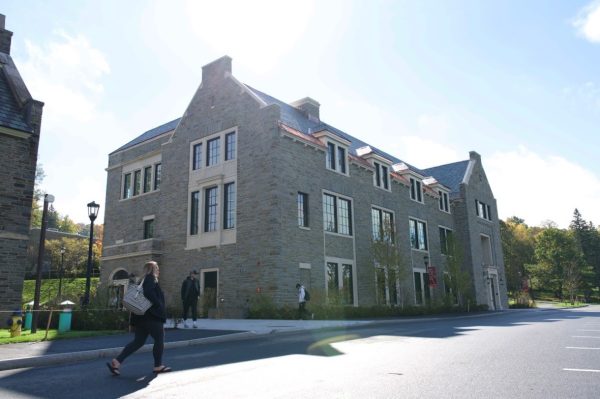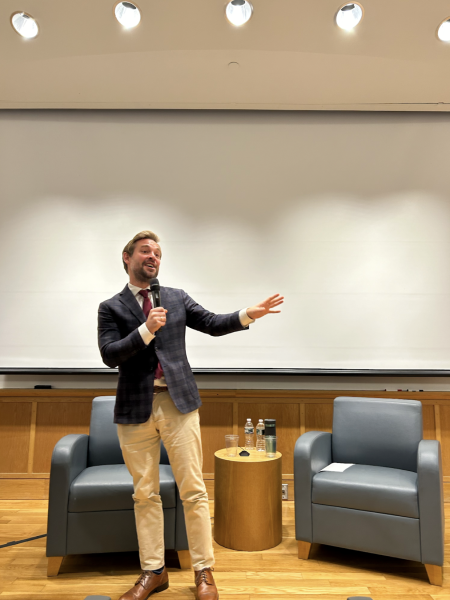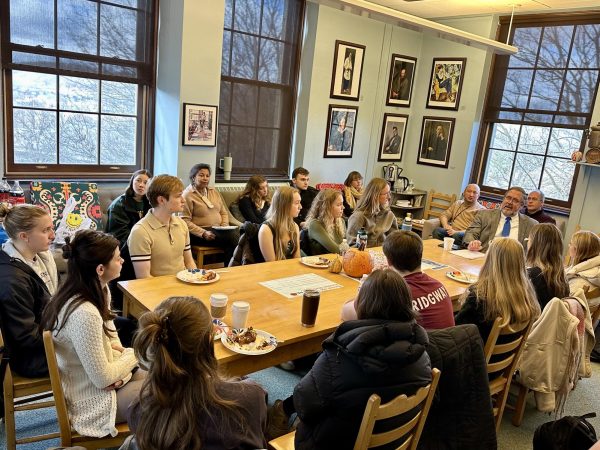Colgate Holds Forum on Politics and Culture with Writers for Democratic Action
In the wake of last year’s political and social turbulence, the Colgate English Department hosted a humanities symposium earlier this week as a forum for discussion surrounding the literary and political activist group, Writers Against Trump, later renamed Writers For Democratic Action. The group’s founding members include Donald M. and Constance H. Rebar Professor of Humanities Peter Balakian.
Balakian remarked that the moment of social engagement and civic activism had been pushed to its crisis during the infamous summer months of 2020 and that he, like many writers, scholars and creators, found a realm of influence within the civic space to educate and mobilize the masses towards positive social change. In his opening statement, he expressed his hope that the symposium would, “create a forum for conversation about politics and culture, writers, scholars, and communities, in relation to the nation we live in.”
The group of leaders in their respective academic fields formed a committee in late August 2020 dedicated to protecting and preserving democracy: a concept that Balakian said was weakened under the Trump Administration. The group coined the name Writers Against Trump (WAT), later renamed Writers for Democratic Action (WDA), and worked to bring together members of the literary community to demand racial and social justice, champion universal suffrage and oppose impediments to democratic governance, according to their website.
Jules Lattimer, a founding member who helped facilitate the discussion, asserted that Trump’s defeat is widely recognized as a success-story for long-game grassroots organizing, championed most notably by Georgia House Minority Leader Stacey Abrams. Abrams was the first black woman to become the gubernatorial nominee for a major party in the United States, and throughout her political career she has created multiple foundations devoted to voter rights and educating the public on election reform.
With Trump now out of the White House, the committee has shifted its focus towards a more general rejection of minoritarian institutions, and is currently working to abolish the filibuster, end gerrymandering and dismantle mechanisms of voter suppression.
Lattimer is a recent graduate from Boston University with a Masters in Creative Writing and wants to encourage writers to consider how their efforts may be essential to causes in the pursuit and protection of democracy.
“With fresh eyes, [students] might be able to see an opportunity for writers to participate in the political sphere that established writers, with their publishing contracts and tenured professorships, might not be able to see,” Lattimer said.
Sophomore Maggie Aulman said she felt appreciation for the sacrifices writers and cultural leaders make as members of society while being persecuted for their influence.
“I thought it was really interesting how the organization took that momentum from the fall and ran with it to get votes and promote democracy, while transitioning their focus to other policies for the future,” Aulman said.
Lattimer said that there is still a great deal of hard work to be done to dismantle systems of oppression.
“[Trump’s presidency was] a product of anti-democratic institutions and centuries of systemic racism and other oppressive systems,” Lattimer said.
Both Lattimer and Balakian stressed that, as both citizens and writers, they had the responsibility to imagine a better future, articulate complex issues and arouse the greater community through language.
“It is our occupational hazard to try to write and speak what needs to be written and spoken, to clarify what’s happening in our own minds, and perhaps help others manage better to live in the world. Writers have to write. Silence was the wrong statement,” Balakian said.
Erin Knox is a senior from Branford, CT concentrating in English with a minor in economics. She has previously served as a staff writer for The Maroon-News....






